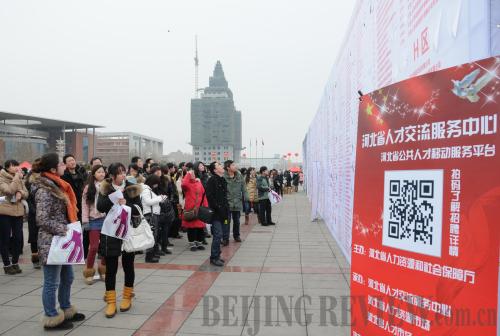|
 |
|
BACK TO ANXIETY: After the Spring Festival, job hunters crowd a job fair held in Shijiazhuang, north China's Hebei Province (QI LEIJIE) |
Opposite Investment Trend
Foreign direct investment (FDI) inflow into China shrank by 7.3 percent year on year to $9.27 billion in January 2013, the Ministry of Commerce (MOFCOM) said on February 20.
The pace of decline quickened from the 4.5-percent drop registered in December. The country's FDI inflow has been dropping since June 2012 as the global economy falters and China's labor costs increase.
In January, the manufacturing sector received the largest share of FDI, which reached $4.43 billion, down 5.8 percent year on year.
FDI for the service sector witnessed a greater decline. The sector saw $4.03 billion of FDI in January, down 9.8 percent year on year. Particularly, FDI in the property sector dipped 14 percent from a year ago.
Although the January FDI figures have dropped, there is some positive news, said MOFCOM spokesman Shen Danyang. In January, the EU set up 140 enterprises in China, with a total investment of $820 million, up 30.8 percent and 81.8 percent, respectively, year on year.
Compared with the lackluster FDI figures, Chinese outbound direct investment (ODI) in non-financial sectors amounted to $4.91 billion in January, an increase of 12.3 percent year on year.
The Chinese invested in 777 foreign companies in 123 countries and regions.
Chinese investment in ASEAN, Australia, EU and the United States even doubled compared with January 2012.
Among all regions, Shandong, Guangdong and Jiangsu provinces as well as Beijing were top outbound investors.
More U.S. T-bonds
China remains the largest foreign U.S. creditor after increasing its holdings of U.S. Treasury bonds by $19.7 billion in December 2012, data released by the U.S. Treasury Department showed on February 15.
December 2012 was the third consecutive month in which China increased its holdings of U.S. Treasury securities.
A total of $1.203 trillion in U.S. Treasury bonds were held by China at the end of 2012.
Japan, the U.S.'s second largest creditor, also increased its holdings of U.S. Treasury bonds to $1.12 trillion in December.
At the end of December 2012, U.S. Treasury bonds held by major foreign creditors totaled $5.56 trillion, higher than the $5.54 trillion in November, and an increase for 12 consecutive months.
First Profits
Hong Kong Disneyland announced on February 18 that it earned a profit of HK$109 million ($14.06 million) in the fiscal year ending September 29, 2012, the first time the park recorded a profit since its opening in 2005.
The park generated record revenues of HK$4.27 billion ($550 million), up 18 percent from the previous fiscal year.
A record 6.73 million people visited the park during the fiscal year, up 13 percent. Chinese mainland and overseas tourists accounted for two thirds of the total attendance.
Andrew Kam, Managing Director of Hong Kong Disneyland Resort, said the result was encouraging, adding that the attendance, hotel occupancy and guest spending levels continued to smash records.
| 